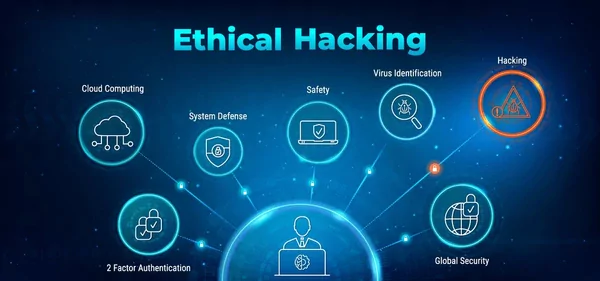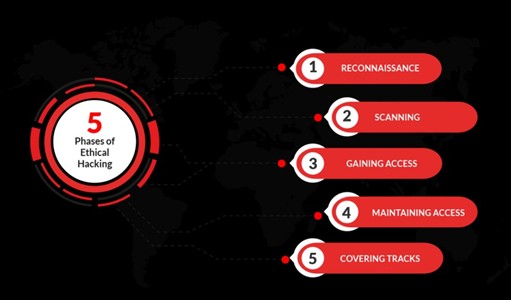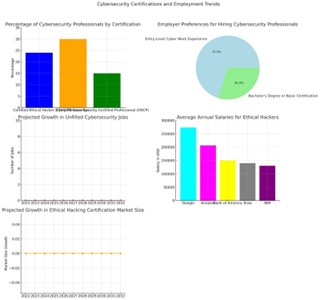
How to Get Ethical Hacking Internships as a Student?
- Posted by 3.0 University
- Categories Ethical Hacking
- Date May 7, 2025
- Comments 0 comment
Ethical Hacking Internships
For those looking to make their way in cybersecurity, internships focusing on ethical hacking are vital. Aspiring professionals tend to benefit exceedingly from these internships offer aspiring, with a chance to develop crucial skills.
The ones that are colossally benefited from the real-world experience gained through internships are the Ethical hackers who work to find and fix weaknesses in systems,
These opportunities can take various forms, including summer programs, part-time positions, or co-op placements, each offering exposure to practical situations.
A strong resume, like the one in the image, needs to show off relevant experience and also use numbers to highlight accomplishments, which really makes you stand out to employers.
Ethical hacking internships also create a lively learning atmosphere where students get to handle real problems.
As [cited in the image] points out, “students enjoyed solving such real-world problems,” finding vulnerabilities, and boosting their cybersecurity skills.
So, jumping into these internships helps students smoothly transition from what they learn in school to what’s expected in the cybersecurity world.
Types of Internships Available in Cybersecurity
Cybersecurity internships present a wide array of possibilities for students, each carefully designed to align with distinct specializations and skill sets.
You might find yourself in penetration testing, or perhaps in a role focused on risk assessment.
These internships, in general, furnish invaluable practical experience needed for those aiming to become ethical hackers.
For example, penetration testing internships often ask candidates to perform mock attacks on systems, helping them sharpen their abilities in vulnerability identification.
Risk assessment internships, on the other hand, usually emphasize the evaluation of an organization’s security, advising on how to make things better; such work builds a more complete grasp of security protocols.
A look at professional profiles—consider the resume in—illustrates how particular skills—intrusion detection and encryption, for instance—are key for doing well in these roles.
This real-world exposure does more than simply improve a student’s credentials; it also deepens their understanding of the essential steps of ethical hacking, as discussed in the image.
Exploring these different internship types allows students to strategically set themselves up as strong contenders in the cybersecurity domain.
A typo can exist here or there.
AI-Powered Ethical Hacking Course – Only at 3.0 University
Unlock the power of Artificial Intelligence in the world of ethical hacking. From penetration testing to threat detection, learn how AI is revolutionizing cybersecurity. 100% online. Globally recognized certification included.

Image1. Five Phases of Ethical Hacking
Industry | Internship Type |
Technology and IT | Penetration Testing, Security Operations Center (SOC) Analyst |
Finance and Banking | Incident Response, Risk Assessment |
Healthcare | Network Security, Compliance and Governance |
Government and Defense | Cybersecurity Analyst, Intelligence Officer |
Retail and E-commerce | Digital Forensics, Security Operations |
Energy and Utilities | Infrastructure Security, Threat Mitigation |
Media and Entertainment | Intellectual Property Protection, Streaming Security |
Types of Cybersecurity Internships by Industry
How to Become an Ethical Hacker?
Here are a few steps! So, when you’re trying to get into ethical hacking, it’s really about building a solid base—and that starts with getting the right education.
Think about degrees like computer science, maybe information technology, or even cybersecurity itself.
These programs? These programs will provide you with a comprehensive understanding of networks, the functioning of systems, and the intricate details of software security.
Now, school isn’t everything. Certifications definitely matter.
Stuff like the Certified Ethical Hacker (CEH) or CompTIA Security+ shows you know your stuff, and honestly, they make you way more attractive to employers in the, shall we say, intense cybersecurity job market.
But it’s not just about books and tests.
You must engage in hands-on learning. Labs and simulations— that’s where it’s at. You apply your knowledge in practical situations.
Essentially, networking with other people in the cybersecurity world works wonders — and the platforms that come handy to connect with them are viz. forums, meetups, online groups? This can lead to opportunities such as mentorship and internships.
It is generally understood that organizations want people who can think on their feet because the digital world never stops changing.
If you stick to this, you can be a real contender for those ethical hacking internships, matching your skills with what companies actually need.

The chart shows numerous facets of cybersecurity certifications and employment trends. It further includes a bar chart that illustrates the percentage of cybersecurity professionals holding specific certifications, with a distinguished emphasis on the Certified Ethical Hacker and CompTIA Security+ certifications.
Besides, a pie chart lays emphasis on employer preferences in hiring, showing a preference for entry-level cyber work experience over formal education.
Moreover, the line charts depict projected growth in unfilled cybersecurity jobs and the ethical hacking certification market size, both indicating significant demand in the field.
Finally, a bar chart presents the average annual salaries for ethical hackers at top companies, reflecting the lucrative nature of these roles.
Ethical Hacker Job Requirements
Landing an ethical hacking internship means grasping what employers really want from applicants.
Characteristically, they constantly keep looking for a robust base in computer science, an in-depth understanding of cybersecurity fundamentals, and some real-world experience with network security protocols.
Things like being proficient at encryption, spotting intrusions, and analysing risk are vital for anyone wanting to be an ethical hacker, so a wide range of skills is key.
Additionally, possessing several certificates viz. Certified Ethical Hacker (CEH) or CompTIA Security+ can immensely bolster a student’s application with handful of advantages.
For example, let’s consider the table below; it typifies the significance of accomplishments in projects and internships with quantifiable data on a resume.
Essentially, it highlights why candidates need to prove their skills in practical settings, making them stand out to potential employers.
All in all, a solid foundation—mixing education, certifications, tech skills, and experience—is what helps you land an ethical hacking internship in this competitive area.
Requirement | Details |
Educational Qualification | Bachelor’s degree in Computer Science, Information Systems, or a related field. In some cases, sufficient experience can substitute for formal education. |
Certifications | Preferred certifications include Certified Ethical Hacker (CEH), Offensive Security Certified Professional (OSCP), GIAC Penetration Tester (GPEN), and CompTIA Security+. |
Technical Skills | Proficiency in programming languages (e.g., Python, C, C++), knowledge of networking protocols, expertise in penetration testing, and understanding of cryptography. |
Non-Technical Skills | Strong analytical and problem-solving abilities, excellent communication skills, ethical mindset, and continuous learning attitude. |
Work Experience | Previous experience in information technology roles, such as network or systems administration, is often required. |
Average Salary | As of January 2025, the average annual salary for an Ethical Hacker in the United States is $112,137, with a typical range between $100,550 and $126,061. |
Job Outlook | The employment of information security analysts, including ethical hackers, is projected to grow 33% from 2023 to 2033, much faster than the average for all occupations. |
Ethical Hacker Job Requirements and Salary Statistics
Conclusion
What’s the most important aspect? Well, it simply integration of students’ their knowledge and experiences—which is bound to create a convincing chronicle that talks the about the highpoints of their skills and goals in order to secure an ethical hacking internship.
It much beyond merely showcasing tech skills; it’s about demonstrating the fact that they immensely serious about tackling cybersecurity’s big problems.
Internships, from diving into penetration testing to figuring out risk, give you the analytical chops and real-world experience to stand out.
Just look at resumes like the one in the image below—successful folks usually point out exactly how they’ve protected systems, with numbers and everything.
Therefore, if you can articulate your accomplishments and align them with the requirements of ethical hacker jobs, you will undoubtedly attract the attention of employers.
Essentially, a solid profile, backed by relevant internships and knowing your ethical hacking phases, is key to landing a spot in this tough field, setting you up for a rewarding career in cybersecurity.
AI + Ethical Hacking = Unstoppable Career Growth
In today’s digital era, cybersecurity threats are growing more sophisticated—and so are the tools to combat them. 3.0 University presents a revolutionary AI-powered Online Ethical Hacking Course that blends the science of hacking with the intelligence of automation.
This one-of-a-kind program empowers you with real-world skills in penetration testing, vulnerability assessment, and threat intelligence—supercharged by Artificial Intelligence.
Whether you’re a beginner or an IT professional, our curriculum ensures you learn from scratch and advance to expert-level, backed by global certification and an assured internship.
Why settle for traditional hacking skills when you can be AI-smart? Enroll today and become the future-ready
You may also like

How to Learn Ethical Hacking without Experience in 2025?

